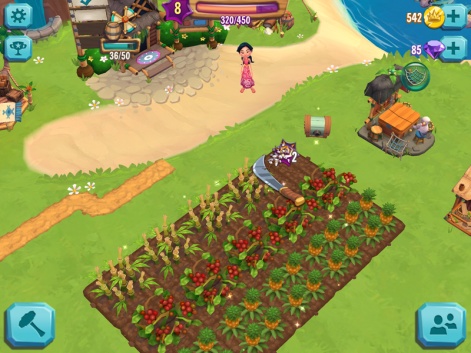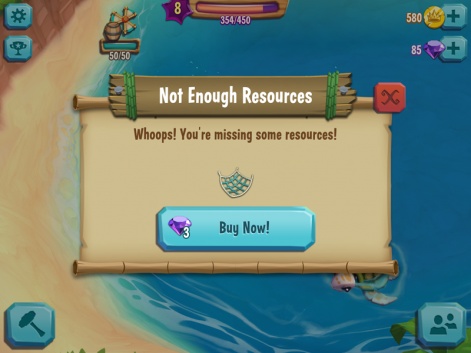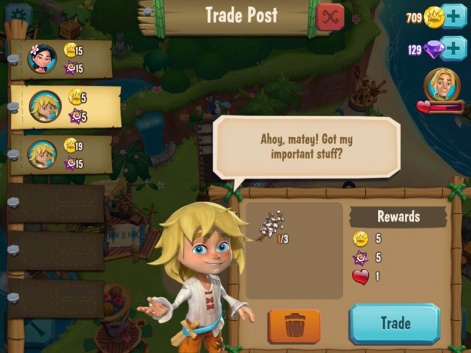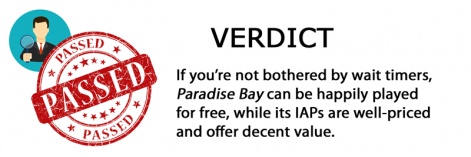Welcome back to the In-App Purchase Inspector - our regular look at free-to-play games from the consumer's perspective.
In each instalment, we consider the incentives or pressure applied to make in-app purchases, their perceived value, the expansion offered by IAPs and the overall value of the experience.
The end goal is to see whether the game makes a good enough case for us to part with our cash, or whether players are content - or engaged enough - to 'freeload'.
This time, we're taking a look at the King-publised Z2Live-developed island-based resource management game Paradise Bay.
Marooned
Paradise Bay isn't too dissimilar from a number of other farming games on the App Store such as FarmVille and Hay Day - gentle experiences that have you collecting natural resources and using them to manufacture saleable items, as well as trading with other players.
Established as the trademaster of an idyllic island, you can command servile animals to catch fish for you, make juice from freshly-grown pineapples, and generally wait on the every whim of your fellow islanders.

The game has plenty of character, and does a good job of immersing you in a world of green pastures, palm trees, and shimmering blue waters.
But, at its core, there's nothing we haven't seen before. Can the same be said of its monetisation?
A trademaster's expenses
There's not a lot of what you might call traditional 'gameplay' in Paradise Bay. Instead, it's something you might check in on a few times a day.
Paradise Bay isn't too dissimilar from a number of other farming games on the App Store such as FarmVille and Hay Day.
You push things in the right direction, things tick along without you, and then you reap the rewards upon your return.
With this in mind, critiquing its wait timers - on which basically everything in the game relies, from catching fish to growing crops - becomes somewhat harder to criticise.
It's a lot less thorny than, say, the wait timers in Angry Birds 2, as that's a game that lends itself far better to traditional play patterns.
In a game like Paradise Bay, the wait timers aren't simply obstructions but almost an essential part of the game's rhythm - sow, wait, collect, repeat. Interestingly there's also no whither, so whenever you revisit your island, your crops are ready to be harvested.
Paradise Bay has two currencies - coins (soft) and gems (hard) - both of which are handed out in fair quantities. Coins are given as rewards for meeting the requests of islanders, while gems (used for speeding things up and buying resources) magically appear in small quantities in treasure chests; a nice retention mechanic. Gems can also be converted to coins.
There's also a good achievement system, by which you're awarded hard currency for reaching certain milestones of productivity.
This, coupled with the healthy sum of 50 gems you're given from the off, should be enough to accelerate through the early game without any real problems.
Offshore investment
Should you need to buy any more, gem packs range from 100 for $1.99 to 7250 for $99.99. And, unusually for games examined in this series, even the lowest tier is worth something.

Ordinarily, in my experience, the lowest tier in a free-to-play game offers such a small reward that it's hardly worth bothering with. It's a basic trick to get players to spend that little bit more for greater value, and it works.
However, in the context of what you'll be spending it on in Paradise Bay, 100 gems is actually a decent haul.
Transactions in Paradise Bay are 'microtransactions' in the truest sense of the word - small, quick, and awfully more-ish.
Given that buying missing resources and skipping wait timers - the only gem transactions you're likely to need in standard play - tend to cost between 1 and 3 apiece, 100 gets you a fair bang for your (2) buck(s).
However, the transactions in Paradise Bay are 'microtransactions' in the truest sense of the word - small, quick, and awfully more-ish.
And so, low value as they are, the impatient player will always find it all too easy to deplete a stash of 100 gems in a relatively short period of time.
Of course, that's not a slight on King - in fact, it's a testament to how well it understands player psychology and the just-one-more appeal of low value transactions - but, knowing how prone I am to this, I was aware that I'd need more than 100 gems to play with.
The cost of impatience
So, in the end I opted for 260 gems at $4.99, which seemed pretty reasonable and allowed me to accelerate my way to level 10.

However, unless I want to spend more, I think I'm done now. The wait timers, while of a rather reasonable length, are just too many for me and the way I like to play free-to-play games.
But this is not a criticism.
Having various tasks on the go is literally the game when it comes to the resource management genre. To criticise it would be like criticising an FPS for having guns.
Paradise Bay doesn't milk it, either. It may make you wait for a lot of things, but there are no ridiculously long wait timers à la Dungeon Keeper to pressure you into spending. Everything is within reason for a non-payer.
In a nutshell, the monetisation of Paradise Bay is everything you'd expect from a game of this type - erring on the generous side, if anything - and if you're after a game to check up on once a day you'll find something to enjoy here without spending a penny.






















